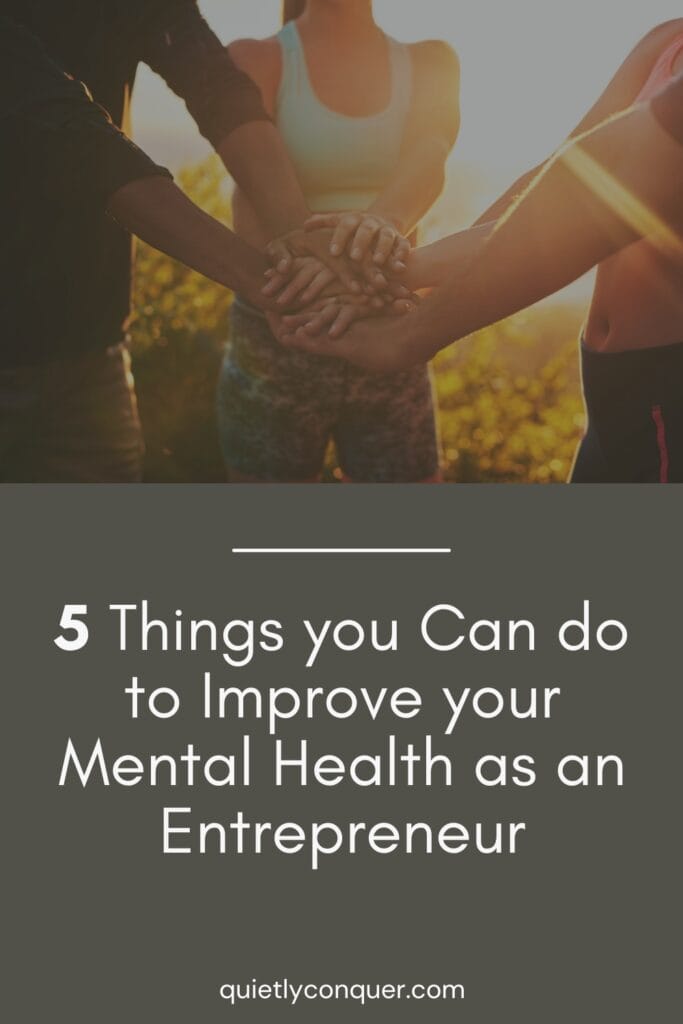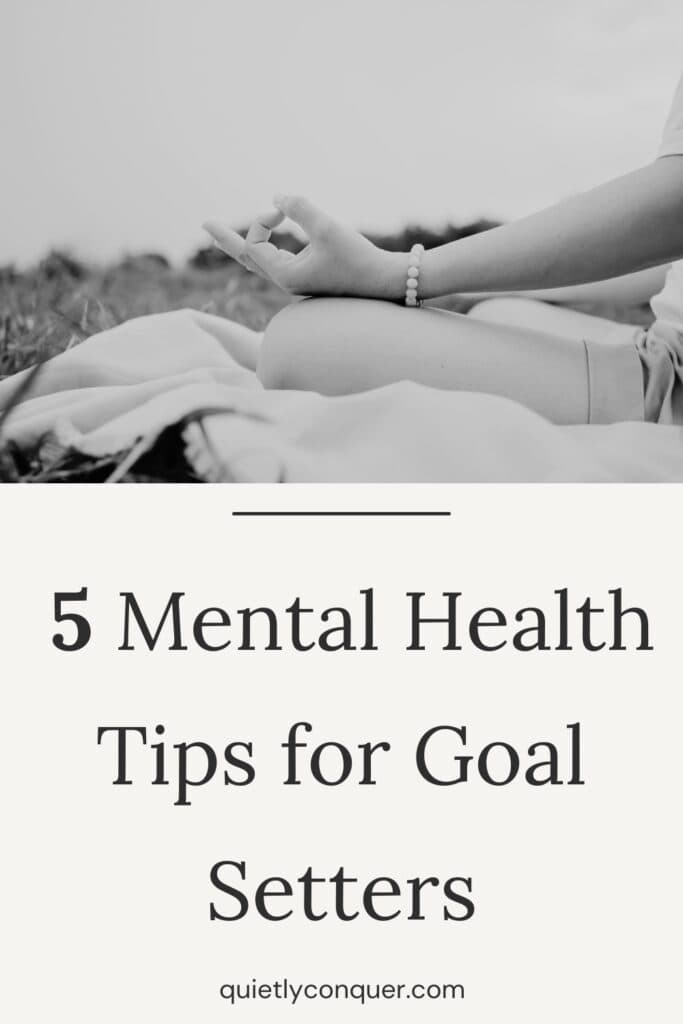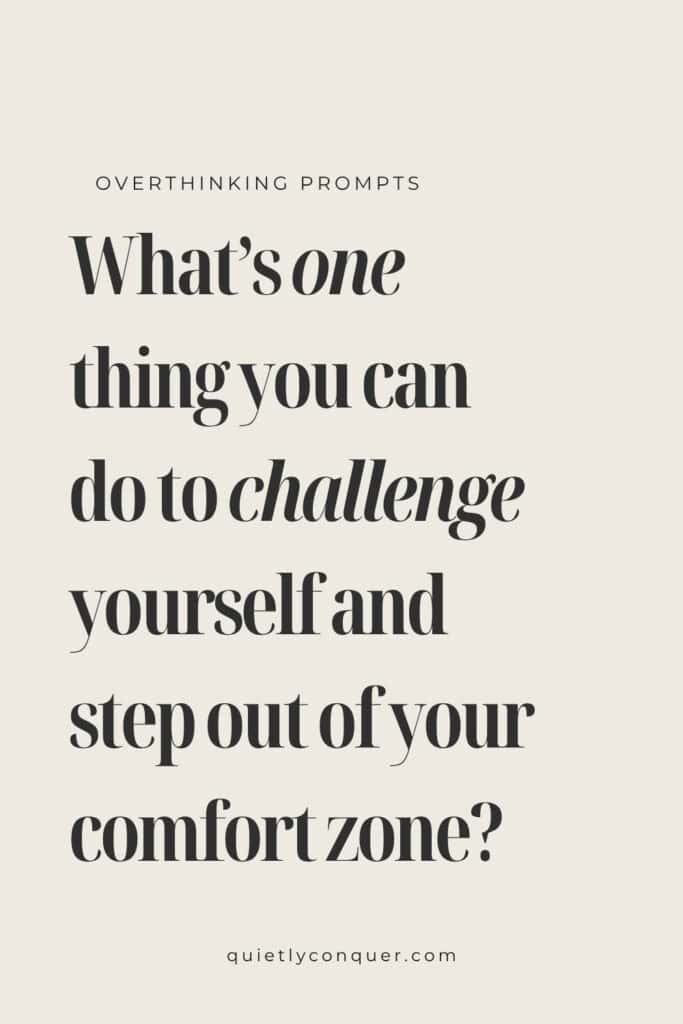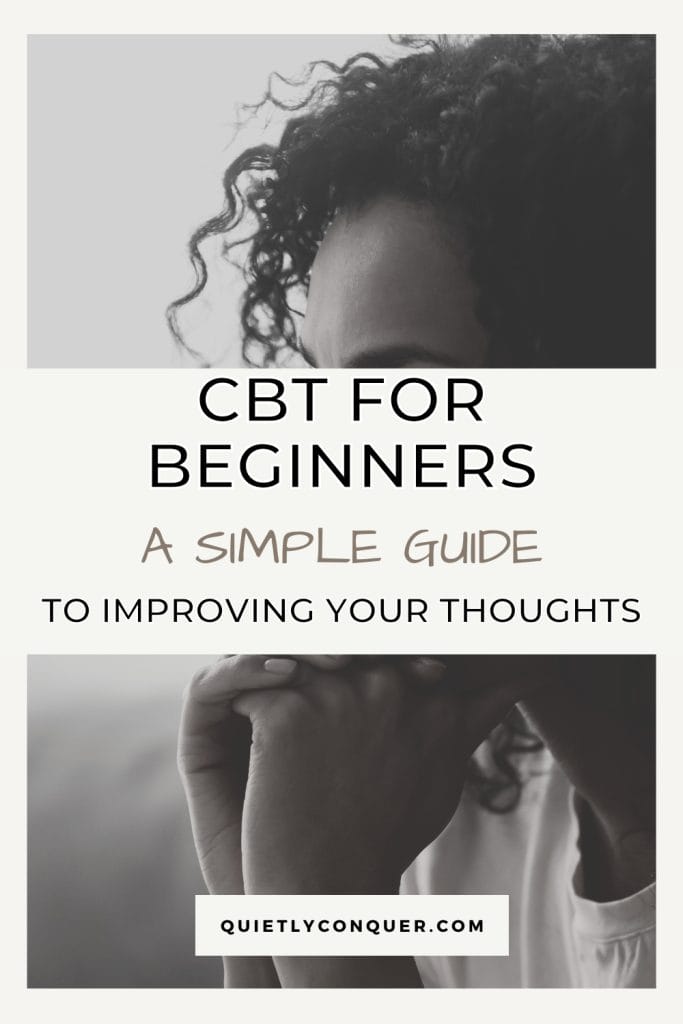5 Easy Mental Health Tips As You Work Towards Your Goals

Mental Health Tips
Mental health & mental well being can be overlooked so often, especially when you're focused on achieving goals, finishing projects or setting up a business. But it's during these times that taking care of yourself and your mental health is vital.
As well as working as a coach, tutor and creating and selling digital products, I'm also an experienced therapist. I've been working with clients since January 2018, and throughout that time I've learned so much about the impact that mental health can have upon a person's' entire life.
With personal experience of mental health issues, it's a topic very close to my heart, and this blog will explore some of the things you can do to improve your mental well being as you continue to work towards those goals of yours.
*Affiliate Disclosure: Some links in this post may contain affiliate links. If you purchase something via the link, I may receive a small commission. This doesn't affect the price you pay.
If you have any questions, reach out for a chat [email protected] or check out my other blogs
Table of Contents
Why is burnout and poor mental health so common?
If you're an ambitious person, an entrepreneur or high achieving professional, burnout and poor mental health can be a real risk. Why? It's usually because we're so focused on achieving a specific goal, that any form of self care – even the basics like sleeping, nutrition, and taking time off – becomes very low on your list of priorities.
If you're neurodivergent, an introvert or manage low energy (from chronic illness or mental health struggles), this can be even more of a risk simply because you need to take extra care of yourself – not less!
For me, working as much as I can for as long as I can is tied in with managing invisible illness (ME/CFS). When I have energy I make sure I use it – usually leading to the boom / bust cycle. This along with the way my brain works – hyper-focused Neurodiverse – it makes it too easy to burn out in only a matter of days.
If this sounds like you, I'm sure you've been in the same position where you're working like crazy on something and everything else is dropped – family, housework and the basic self-care of eating well and getting enough sleep. While it may be okay for a short while, if this continues, it can have a big impact on your overall mental health.
This blog is to help you learn how to continue making progress without compromising your health and wellbeing. Mental health is closely tied in with physical wellbeing, how much sleep you get, and how balanced your life is.
If you already manage mental health issues, it's even more important that you continue to take good care of yourself, so that you get to see those results you're working so hard towards, and have some fun along the way!
Mental Health Tip 1: Sort Your Sleep!
As a recovering insomniac I cannot express how important getting enough sleep is. I feel like a nagging mother when I talk about this, but honestly, coming from someone who never slept more than 3-4 hours for several years, the difference proper, restorative rest makes is indescribable.
But – how can you do this when you're buzzing with information, learning new things, and you're in that wonderful state of flow with your work?
You commit to a switch off time that is non negotiable. Even if you've committed in the short term to work 10+ hours on this project, there absolutely still needs to be a cut off if it's lasting more than a day or two.
If you're not up against a strict deadline, ask yourself what difference an extra day or week will make to the overall goal?
To prepare for bed, do things to help you relax as quickly as possible. For example, limit phone / screen time. Take a hot shower or a relaxing bath, and give yourself time to unwind before you jump into bed.
If your mind is anything like mine (relentlessly busy!), get yourself a nice notebook or journal that you keep beside your bed. When ideas pop into your head – like they love to do when you're drifting off – write them in your notebook or journal and release them.
Another trick I learned as a student is to do a mindful debrief when you lie down. It can be done before you even get into bed, but when my brain is particularly busy, I lie down and run through a few things I had completed that day. I briefly talk through in my mind some of the things that I will focus on the following day, and that's often enough to allow my mind to switch to relaxation.
I honestly cannot express how effective this was and still is for me. It acts like a cue for my brain, and within minutes I'll drift off, and not wake at 2am hyper-focused on everything I need to get done the following day. It's like a brain dump without writing it down!
Mental Health Tip 2: Take A Break
You may have a routine of sorts where you stop for lunch, afternoon snack etc. But, if you start to plan breaks in as part of your weekly schedule, you will soon create a healthier and more balanced day. As you plan your week, plug these into your calendar as well – like you would you calls or meetings. This helps keep boundaries, and limits the risk of overstretching yourself.
Your brain cannot focus for hours and hours on end without a break, and still be as functional and efficient as it is at the start of your day. Recharging your mind and your body helps with your performance, focus, energy levels & your mindset.
If you can, use the time you set back to get outdoors, take a walk or connect with others. Doing things that you enjoy will also support positive mental wellbeing.
Time-blocking techniques like the Pomodoro technique can be great for this, as you work for set periods throughout the day with breaks between sessions.
If you find several breaks a day too distracting, choose 1 or 2 days to take longer breaks, or finish early. It doesn't matter how this looks for you, as long as your mind is getting space to focus on something other than the work you're doing. It's also a great way to keep creativity high, and stay enthusiastic when you are working.
Mental Health Tip 3: Habits & Routines
Developing supportive habits and routines gives you structure, which can take worry or uncertainty out of situations. When you know what you need to do, it reduces the risk of decision fatigue, and if you're working on something that feels challenging, it can provide comfort in knowing what steps to take to keep moving forward.
They also help with boundaries and creating more balance in your work / home life. This is especially important if you work from home. It's easy for your work to slip into your home life when you're working so hard, which can leave you feeling like you're never getting a break. Having supportive habits and routines in place helps you hold those boundaries.
For example, having a ritual for the start and end of your day to help you transition into work mode in the morning, and back to personal mode when you're done for the day. This can be as simple as putting focus music on as you sit to your desk, or doing your daily review and plan and tidying your desk to mark the end of the day, and physically moving away from that area.
Think about what daily or weekly habits or routines you can add in to help you stay on top of things and ensure that you're having enough downtime.
For example, a morning routine might include:
- Journaling
- Gentle stretching for 5 minutes, or a workout
- Reading
- Enjoying a cup of coffee in the quiet before anyone else gets up!
- Reviewing previous work and planning the day ahead
To finish the day, having clear routine will quickly teach your mind that it's time to switch off. This helps you to maintain positive mental health as you're respecting those boundaries and allowing yourself to take those much needed breaks to rest and restore.
Mental Health Tip 4: Connect With Others
Connection with others is a key part in maintaining good mental health. If you're more introverted, don't think of this as having to show up daily to meet people, but staying connected with your circle, your close friends or family is so important.
If on the other hand you're a people person and someone who's energised by others, make this a priority in your self-care plans. If all you do is eat, sleep and breathe work, it's very easy to lose who you are.
Reaching out to others when you feel like things are getting on top of you, or you're finding it difficult to cope can provide you with different perspectives and help you feel less alone. If you're in therapy, discuss with them how you're feeling. The act of voicing your feelings can be a real release.
If you're working on a goal that's related to growing a business / entrepreneurship / coaching / therapy, try to connect with others who are working on similar things. Being able to discuss your work and progress with likeminded people who ‘get it', can be hugely beneficial.
Mental Health Tip 5: Check In With Yourself
If you've lived with mental health issues like anxiety for a while, you'll probably have a good idea of the signs that start to show when things aren't going so well.
But to avoid getting to the point where you're already feeling the impact, regular ‘checking-in' with yourself can help you spot the signs and put things in place. Journaling is great for this, and something I do recommend to others. Self-awareness is key, and journaling can not only help you notice subtle changes in your mood, but also enable you to process these things in the moment.
You may prefer to meditate rather than journal, whatever your preferred way is, take the time to be present in the moment, check in with yourself, take slow, deep breaths, and calm any worries or concerns you may have.
If you're constantly running at 100 mph all day every day, the likelihood is you're going to be exhausted or stressed out. Finding time to pause for a moment, to breathe and quieten your mind helps you to manage your emotions, and keep on top of how you're feeling each day.

The Calm Mornings Journal
Download your free mini journal to help you create a calm morning routine.
It includes daily reflection pages, 20 journal prompts, 15 micro-habit ideas, and lined and dotted journal pages.
When you make the time to support your mental health as you're working towards your goals not only promotes mental wellbeing, but it also helps improve your productivity, motivation and focus.
Think of yourself like a phone that needs to be recharged in order to keep working, or a car that needs fuel to keep running. You can only go so far without pausing to refill.
I understand how difficult it can be at times to take breaks, and focus on you, especially when you're head-down in a passion project, but it's essential if you want to stay healthy, happy, and able to see your project through to the end.
Your mental health is important, so taking time for yourself is something that needs to be prioritised as much as those action taking tasks in your planner!
How Will You Prioritise Your Mental Health?
- Focus on sleep and nutrition
- Take real time off from your work
- Introduce supportive habits and routines to promote mental health & wellbeing
- Connect with others
- Take time to quieten the busyness – be aware of any signs of stress or anxiety
I'd love to know how you plan to take care of yourself, either leave a comment below or email me your thoughts – [email protected]
Final Thoughts…
I do understand how difficult it can be to juggle everything, and nine times out of ten, the one thing that slides is looking after yourself and your mental health and wellbeing.
Self-care doesn't have to be big or flashy, some of the things discussed in here can go a long way in ensuring that your work doesn't seep into every single aspect of your life.
It's really easy to get swayed when you're in the online world by the progress and successes of others. Be sure that it's not comparison or ‘shoulds' that are driving this need to work all hours.
Your situation is unique to you, and comparing your own situation to others who may be further down the line than you, or who may be able to outsource some of their work, just adds to the feeling of pressure.
Remember, this is your business, your project, your goals. When you choose to focus on your own progress, taking care of yourself, and having the right support in place; you will achieve your goals without compromising your mental health along the way!
Tools, Resources & Support
Each post I add my favourite tools and resources, so here are some more just for you!
Shopify Growth Collective – Are you thinking of creating your own Shopify store? Or, do you have a store but need to work on growing it? The SGC is a brilliant little membership that will help you get the basics in place, learn how to grow your audience and top tips on creating a beautiful shop!
Mental Health Daily Journal – A CBT-Based undated daily journal printable. You can print and use at home, or use digitalling with note taking apps like GoodNotes. Includes a daily check-in, Thought reframing, gratitude, affirmations and more! Visit the Quietly Conquer Store.
Etsy – Are you ready to create your own online store? Etsy is a brilliant shopping platform that's used by millions. Setting up your store is simple, and when you sign up with this link we both get 40 free listings!
Pinterest Guide – If you're looking to get into Pinterest, I highly recommend Amy's free guide and Pinterest course. It's up-to-date for 2025 & she also has a brilliant course for only $67 that's updated frequently. (I have a 50% discount on the course using this link, and the code RANK)
Your Growth System – This all-in-one system for service providers / coaches / therapists / VA's etc. is a perfect way to save time & energy. Improve your productivity and beat procrastination by having everything you need to run your business in one place!
If this post helped or you enjoyed reading it, please share one of the images below as it really helps my blog – Thank You!



Meet Lynsey

Hey there! I'm Lynsey, a counsellor, coach and mentor for women who want to create change, but are feeling lost, uncertain and exhausted. With over 7 years’ experience of training, running businesses, and over a decade as a tutor and adult trainer, I've learned the value of a gentle and intentional approach to work and life that energises you without draining all of your energy.
I've lived with ME/CFS since 2011, and since then re-trained as a counsellor, and achieved a distinction for my Masters in Counselling and Psychotherapy Practice; all while running 4 businesses!
How? Improving your mindset, finding acceptance in yourself, and developing a gentle, but solution-focused approach to achieving goals is key. Knowing that it's not about how fast you move, but finding your own pace and trusting that you can achieve your goals in your own way, one step at a time.
If you'd like to know more about working with me, you can email [email protected] or find me on socials (links in the menu)
Have you seen my online store Quietly Conquer – Find DFY templates, downloads and more!






